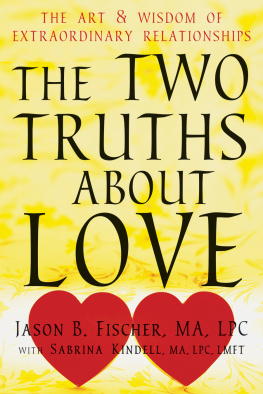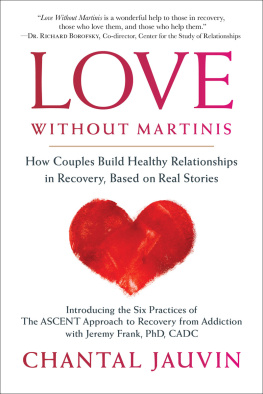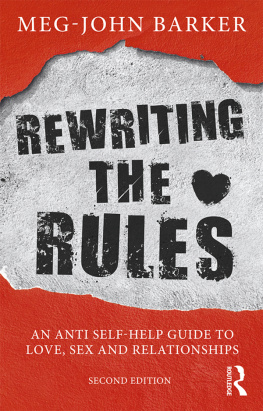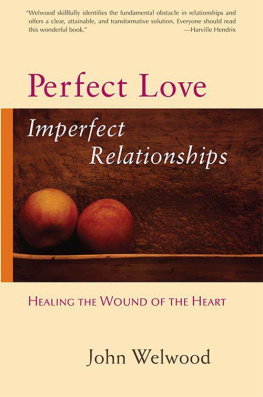Special Praise for
A Mans Way through Relationships
Dan Griffin is the authority on addressing mens issues in recovery. I highly recommend this book to all men who have been socialized in the Man Rules, not just those who identify as being in recovery, in addition to recommending its value for us women who love them, and for any professional working with men. Dans wisdom, writing style, and enlightened insight into twelve-step recovery blend harmoniously in this book, a major contribution to the field.
Jamie Marich, PhD, LPCC-S, LICDC-CS
Clinician and Creator of Dancing Mindfulness
Author of Trauma and the Twelve Steps, EMDR
Made Simple, and Trauma Made Simple
Dan Griffin has written a guidefrom the heartabout the most challenging and ultimately rewarding task for men in our age: navigating the complex maze of intimate relationships. Written especially for men in recovery, his words and guidelines will be valuable for men of all backgrounds at any life stage.
David B. Wexler, PhD
Author of When Good Men Behave Badly
A beautiful book about men and for men, A Mans Way through Relationships takes the reader through the journey of how the Man Rules, as part of socialization, often combine with trauma in early childhood to impact the ability of men to feel safe and embrace and flourish in relationships. I am a big fan of Dan Griffin and his contributions to treatment and recovery. This book is important to men in general, and specifically to men in recovery. Every man needs to read this!
Claudia Black, PhD, Addiction and Trauma Specialist
Author of It Will Never Happen to Me and Intimate Treason
Dan Griffin is a new sort of man, and he has written a new sort of book about men: honest and courageous, yet vulnerable and accessible. His perspective has been so thoroughly imbued with what he has learned about men from his experiences with men in recovery that his work fairly crackles with the immediacy of the mens lives. Relationships are a central part of these lives, no lessand no morethan they are for women. Dans style is alternately authoritative and self-effacing, reflecting what he knows to be the case about male vulnerability: that it is only through this vulnerability, not around it, that men become all that they may be.
Roger D. Fallot, PhD
Director of Research and Evaluation
Community Connections
Dans insights and experience as they relate to mens need for love and wholeness through relationships are foundational to a meaningful and complete life. From both an experiential and theoretical perspective, the concepts are made accessible, while his passion for the process makes it compelling. The rawness is balanced with gentleness, while his honesty and courage inspire. Our struggle to overcome the isolation and pain inherent in abiding by the Man Rules is validated and the guidance through the process priceless.
Steven Millette
Executive Director, CeDAR
University of Colorado Hospital
A stunning and important piece of work. The Man Rules we all grew up with simply dont serve us wellnot in our relationships and not in our recovery. Dan examines vulnerability in the context of courage, and in so doing lays out a course to help guys like us navigate those relationships in our lives. The edgy beauty of Dans work is that in the process of getting to know ourselves better as men, we will ultimately come to know ourselves as better men.
Bobby Ferguson
Founder and CEO
Jaywalker Lodge



Central Recovery Press (CRP) is committed to publishing exceptional materials addressing addiction treatment, recovery, and behavioral healthcare topics, including original and quality books, audio/visual communications, and web-based new media. Through a diverse selection of titles, we seek to contribute a broad range of unique resources for professionals, recovering individuals and their families, and the general public.
For more information, visit www.centralrecoverypress.com.
2014 by Dan Griffin
All rights reserved. Published 2014.
No part of this publication may be reproduced, stored in a retrieval system, or transmitted in any form or by any means, electronic, mechanical, photocopying, recording, or otherwise, without the written permission of the publisher.
Publisher: Central Recovery Press
3321 N. Buffalo Drive
Las Vegas, NV 89129
19 18 17 16 15 14 1 2 3 4 5
ISBN: 978-1-937612-67-2 (e-book)
Author photo by Craig VanDerSchaegen. Used with permission.
Quotations from Jamie Marich, PhD, used with permission.
Quotations from Peter Levine used with permission.
Lyrics from Lynyrd Skynyrds Simple Man reprinted with permission.
Publishers Note: This book contains general information about relationships, recovery, and mens socialization and development. Central Recovery Press makes no representations or warranties in relation to the information herein; it is not an alternative to relationship, recovery, or medical advice from your behavioral heath professional or doctor or other professional healthcare provider.
Our books represent the experiences and opinions of their authors only. Every effort has been made to ensure that events, institutions, and statistics presented in our books as facts are accurate and up-to-date. To protect their privacy, some of the names of people, places, and institutions have been changed.
Cover design and interior design and layout by Deb Tremper
I dedicate this book to my beautiful daughter, Grace, and all of the boys and girls growing up today in a world so full of possibilities. May this be one more light to help show you the way as you experience the incredible joy and pain of learning how to love and be loved.
And to all of the men, like me, still living with the legacies of the Man Rules, who are struggling to connect and live fully in their relationships.
Table of Contents
by Allen Berger, PhD
The addiction field has been slow in integrating gender-informed treatment. The early pioneers in this area argued that in order to produce better outcomes for women, the unique issues women faced in recovery needed to be incorporated into the therapeutic milieu. In the 1990s Dr. Terry Davis and Dr. Stephanie Covington were two names that stood out in creating female gender-informed treatment protocols. What happened next in recovery paralleled what happened in our society. The first focus of making treatment gender-informed for men emphasized helping men break the cycle of violence affecting families and communities. While a very necessary step, this unfortunately reinforced the stereotype of men as predators, bullies, and lacking in empathy. We were typecast as aggressive and obsessed with power. I am not denying that these are important issues to address in helping men, because they absolutely are; I am saying that we are much more than this. In fact, this focus was quite unfortunate because it stopped short and failed to address the plethora of other issues that men struggle with in accepting help and embracing recovery.
Next page










